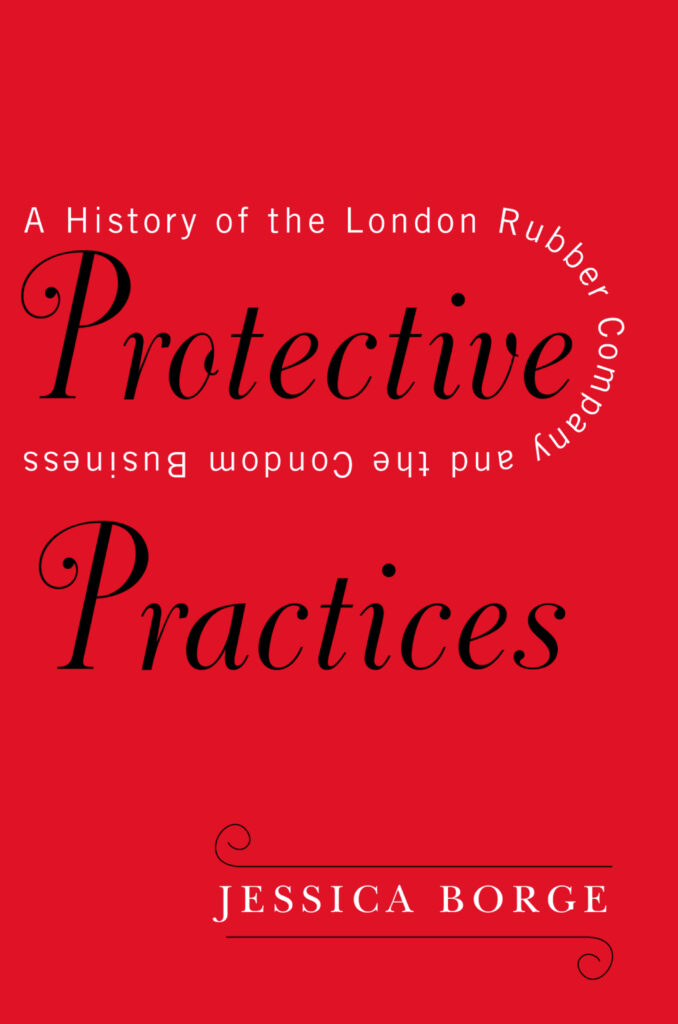Jessica Borge
Protective Practices is the story of the growth and survival of Britain’s biggest ever condom manufacturer, the London Rubber Company, which produced Durex in Chingford from the 1930s to the 1990s. It covers the development of the dipped latex condom in Britain, the technologies of production, competition, the non-profit sector, marketing difficulties, consumer attitudes, strategies used by the company to protect the monopoly, its response to the AIDS crisis, and the company’s last days. Even after the high demand for condoms brought on by AIDS and HIV, London Rubber was brought down by bad investments in photographic processing. This book explains how and why. Protective Practices includes a foreword by Lesley A. Hall, giving a bibliographical overview of the history of contraception.

NOTCHES: What drew you to this topic and what questions do you still have?
Jessica Borge: When I started this project, I wasn’t looking at condoms at all but, rather, the oral contraceptive pill and how it was marketed in Britain in the 1960s. I had heard smutty jokes about the London Rubber Company. When they came up in my research on the pill, and it turned out that they made their own oral contraceptive, I was intrigued. You might say I ‘went off the pill’ in favour of condoms! I realised that so many conversations on birth control focus on women and the idea that women’s need to control reproduction drove the demand for contraception. After seeing that London Rubber made its own pill I started to question this supposition. There remain unanswered questions about gay men’s historic condom use. I found little evidence to support the idea that homosexual men routinely employed condoms in the pre-AIDS era.
NOTCHES: This book is about the history of sex and sexuality, but what other themes does it speak to?
JB: I would say that this book is more about business and society than sex and sexuality, but one could argue that in the case of condoms its impossible to separate these. Naturally the condom industry was underpinned by the fact that people have sex, but London Rubber had a very limited interest in influencing sexual practice, which makes them a good case study for a window on everyday sexual cultures.
NOTCHES: How did you research the book?
JB: This is very much a business-focused study, and it is necessarily interdisciplinary. This relates to the nature of the archive, which I gathered together over about three years from many disparate repositories. At time of writing, the availability of a London Rubber company archive remains unclear. My method was to begin with the company’s correspondence with the Family Planning Association, which is held by Wellcome Collection, and to follow up on leads from there. I found annual reports incredibly helpful. The best part was finding two wonderful people who had worked at London Rubber in the 1960s – Angela Wagstaff and John Harvey. Angela loaned me her personal collection of internal company magazines. John and I spoke at length over three interviews, which was incredibly informative and enjoyable: nothing brings things together like the human voice.
NOTCHES: Whose stories or topics were left out of your book and why? What would you include had you been able to?
JB: London Rubber’s fortunes were made by condoms, but between the 1960s and 1990s they diversified into all sorts of areas, which, sadly, there wasn’t room to expand upon in the book. Toy balloons were a lovely off-shoot of the dipped condom trade, and most British kids growing up in the 1960s, 70s and 80s would have encountered Ariel balloons. London Rubber also offered a free Research and Development service to doctors and surgeons to produce new, experimental medical technologies using their expertise in engineering (all machines were designed in-house) and rubber chemistry. There is probably a great deal to be said here. Elsewhere I have written on the company’s film production unit.
NOTCHES: How do you see your book being most effectively used in the classroom? What would you assign it with?
JB: Protective Practices incorporates wide discussion of the women’s market for contraception, but unlike the majority of modern scholarly works on contraception it is not guided by feminist or power-centred methodologies. It’s also very strong on empirical research and the men’s market. So I think the book would serve as a counter-balance to female dominated accounts of contraceptive development in the twentieth century. It would also make an unusual case study in business history and the history of marketing, connecting them back to sex and society.
NOTCHES: Why does this history matter today?
JB: History has always mattered. The practices and methodologies of historical research also matter, possibly as much as the stories themselves. For me, history is about the quest for understanding the past, on the one hand, and challenging inherited narratives on the other. These narratives come as much from academia and institutions as they do from the mainstream and my belief is that investigative, empirical research – and the accessible presentation of this research – can strengthen our ability to critically appraise all situations, not just historical ones.
NOTCHES: Your book is published, what next?
JB: There is a lot more to say about this dynamic company, and I hope to produce one or two more papers about their non-contraceptive products, and also their digital offering in the 1990s, which is very topical. Then it will probably be time for me to look for a new research topic…but I am very attached to London Rubber and don’t think I’ll be able to shake them off any time soon!
 Jessica Borge is an interdisciplinary researcher in the field of twentieth-century British History, specialising in the intersection of business, society and media. As well as being a Visiting Fellow in Digital Humanities at the School of Advanced Study, Jessica holds a professional position as digital collections/ scholarship manager at Archives & Research Collections, King’s College London. Protective Practices is her first monograph. For more information, see www.londonrubbercompany.com
Jessica Borge is an interdisciplinary researcher in the field of twentieth-century British History, specialising in the intersection of business, society and media. As well as being a Visiting Fellow in Digital Humanities at the School of Advanced Study, Jessica holds a professional position as digital collections/ scholarship manager at Archives & Research Collections, King’s College London. Protective Practices is her first monograph. For more information, see www.londonrubbercompany.com

NOTCHES: (re)marks on the history of sexuality is licensed under a Creative Commons Attribution-NonCommercial-NoDerivatives 4.0 International License.
Based on a work at www.notchesblog.com.
For permission to publish any NOTCHES post in whole or in part please contact the editors at NotchesBlog@gmail.com




